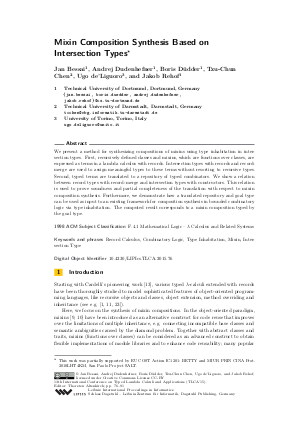Mixin Composition Synthesis Based on Intersection Types
Authors Jan Bessai, Andrej Dudenhefner, Boris Düdder, Tzu-Chun Chen, Ugo de’Liguoro, Jakob Rehof
-
Part of:
Volume:
13th International Conference on Typed Lambda Calculi and Applications (TLCA 2015)
Part of: Series: Leibniz International Proceedings in Informatics (LIPIcs)
Part of: Conference: International Conference on Typed Lambda Calculi and Applications (TLCA) - License:
 Creative Commons Attribution 3.0 Unported license
Creative Commons Attribution 3.0 Unported license
- Publication Date: 2015-06-15
File

PDF
LIPIcs.TLCA.2015.76.pdf
- Filesize: 0.6 MB
- 16 pages
Document Identifiers
Subject Classification
Keywords
- Record Calculus
- Combinatory Logic
- Type Inhabitation
- Mixin
- Intersection Type
Metrics
- Access Statistics
-
Total Accesses (updated on a weekly basis)
0Document
0Metadata
Abstract
We present a method for synthesizing compositions of mixins using type inhabitation in intersection types. First, recursively defined classes and mixins, which are functions over classes, are expressed as terms in a lambda calculus with records. Intersection types with records and record-merge are used to assign meaningful types to these terms without resorting to recursive types. Second, typed terms are translated to a repository of typed combinators. We show a relation between record types with record-merge and intersection types with constructors. This relation is used to prove soundness and partial completeness of the translation with respect to mixin composition synthesis. Furthermore, we demonstrate how a translated repository and goal type can be used as input to an existing framework for composition synthesis in bounded combinatory logic via type inhabitation. The computed result corresponds to a mixin composition typed by the goal type.
Cite As Get BibTex
Jan Bessai, Andrej Dudenhefner, Boris Düdder, Tzu-Chun Chen, Ugo de’Liguoro, and Jakob Rehof. Mixin Composition Synthesis Based on Intersection Types. In 13th International Conference on Typed Lambda Calculi and Applications (TLCA 2015). Leibniz International Proceedings in Informatics (LIPIcs), Volume 38, pp. 76-91, Schloss Dagstuhl – Leibniz-Zentrum für Informatik (2015)
https://doi.org/10.4230/LIPIcs.TLCA.2015.76
BibTex
@InProceedings{bessai_et_al:LIPIcs.TLCA.2015.76,
author = {Bessai, Jan and Dudenhefner, Andrej and D\"{u}dder, Boris and Chen, Tzu-Chun and de’Liguoro, Ugo and Rehof, Jakob},
title = {{Mixin Composition Synthesis Based on Intersection Types}},
booktitle = {13th International Conference on Typed Lambda Calculi and Applications (TLCA 2015)},
pages = {76--91},
series = {Leibniz International Proceedings in Informatics (LIPIcs)},
ISBN = {978-3-939897-87-3},
ISSN = {1868-8969},
year = {2015},
volume = {38},
editor = {Altenkirch, Thorsten},
publisher = {Schloss Dagstuhl -- Leibniz-Zentrum f{\"u}r Informatik},
address = {Dagstuhl, Germany},
URL = {https://drops.dagstuhl.de/entities/document/10.4230/LIPIcs.TLCA.2015.76},
URN = {urn:nbn:de:0030-drops-51563},
doi = {10.4230/LIPIcs.TLCA.2015.76},
annote = {Keywords: Record Calculus, Combinatory Logic, Type Inhabitation, Mixin, Intersection Type}
}
Author Details
References
-
Martín Abadi and Luca Cardelli. A Theory of Objects. Springer, 1996.

-
Steffen Van Bakel. Strict intersection types for the lambda calculus. ACM Comput. Surv., 43(3):20:1-20:49, April 2011.

-
H. Barendregt. The Lambda Calculus - Its Syntax and Semantics, volume 103 of Studies in Logic and the Foundations of Mathematics. North-Holland, 1984.

-
H. Barendregt, M. Coppo, and M. Dezani-Ciancaglini. A Filter Lambda Model and the Completeness of Type Assignment. Journal of Symbolic Logic, 48(4):931-940, 1983.

- Jan Bessai, Boris Düdder, Andrej Dudenhefer, and Moritz Martens. Delegation-based mixin composition synthesis. http://www-seal.cs.tu-dortmund.de/seal/downloads/papers/paper-ITRS2014.pdf, 2014.
-
Jan Bessai, Boris Düdder, Andrej Dudenhefner, Tzu-Chun Chen, and Ugo de'Liguoro. Typing classes and mixins with intersection types. arXiv preprint arXiv:1503.04911, 2015.

-
Jan Bessai, Andrej Dudenhefner, Boris Düdder, Moritz Martens, and Jakob Rehof. Combinatory Logic Synthesizer. In Tiziana Margaria and Bernhard Steffen, editors, ISoLA'14, volume 8802, pages 26-40, 2014.

-
Viviana Bono, Amit Patel, and Vitaly Shmatikov. A core calculus of classes and mixins. In ECOOP, volume 1628 of Lecture Notes in Computer Science, pages 43-66, 1999.

-
Gilad Bracha. The Programming Language JIGSAW: Mixins, Modularity and Multiple Inheritance. PhD thesis, Univeristy of Utha, 1992.

-
Gilad Bracha and William R. Cook. Mixin-based inheritance. In OOPSLA/ECOOP, pages 303-311, 1990.

-
Kim B. Bruce. Foundations of Object-Oriented Languages - Types and Semantics. MIT Press, 2002.

-
Peter S. Canning, William R. Cook, Walter L. Hill, Walter G. Olthoff, and John C. Mitchell. F-bounded polymorphism for object-oriented programming. In FPCA, pages 273-280, 1989.

-
Luca Cardelli. A semantics of multiple inheritance. In Semantics of Data Types, volume 173, pages 51-67, 1984.

-
Adriana B. Compagnoni and Benjamin C. Pierce. Higher-order intersection types and multiple inheritance. Mathematical Structures in Computer Science, 6(5):469-501, 1996.

-
William R. Cook, Walter L. Hill, and Peter S. Canning. Inheritance is not subtyping. In POPL'90, pages 125-135. ACM Press, 1990.

-
Ugo de'Liguoro. Characterizing convergent terms in object calculi via intersection types. In TLCA, pages 315-328, 2001.

- Ugo de'Liguoro and Tzu chun Chen. Semantic Types for Classes and Mixins. http://www.di.unito.it/~deligu/papers/UdLTC14.pdf, 2014.
-
Boris Düdder. Automatic Synthesis of Component & Connector-Software Architectures with Bounded Combinatory Logic. Dissertation, TU Dortmund, 2014.

-
Boris Düdder, Moritz Martens, and Jakob Rehof. Staged composition synthesis. In ESOP, volume 8410 of Lecture Notes in Computer Science, pages 67-86, 2014.

-
Boris Düdder, Moritz Martens, Jakob Rehof, and PawełUrzyczyn. Bounded Combinatory Logic. In Proceedings of CSL'12, volume 16, pages 243-258. Schloss Dagstuhl, 2012.

-
Standard Ecma. ECMA-262 ECMAScript Language Specification, 2011.

-
Tihomir Gvero, Viktor Kuncak, Ivan Kuraj, and Ruzica Piskac. Complete Completion using Types and Weights. SIGPLAN Notices, 48(6):27-38, 2013.

-
Oleg Kiselyov and Ralf Lämmel. Haskell’s overlooked object system. CoRR, abs/cs/0509027, 2005.

-
Martin Odersky and Matthias Zenger. Scalable component abstractions. In OOPSLA, pages 41-57. ACM, 2005.

-
Benjamin C. Pierce. Intersection types and bounded polymorphism. Mathematical Structures in Computer Science, 7(2):129-193, 1997.

-
Didier Rémy. Typing record concatenation for free. In POPL'92, pages 166-176, 1992.

-
Mitchell Wand. Type inference for record concatenation and multiple inheritance. Inf. Comput., 93(1):1-15, 1991.

